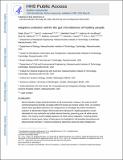| dc.contributor.author | Zhao, Shijie | |
| dc.contributor.author | Lieberman, Tami | |
| dc.contributor.author | Poyet, Mathilde | |
| dc.contributor.author | Kauffman, Kathryn | |
| dc.contributor.author | Gibbons, Sean M. | |
| dc.contributor.author | Groussin, Mathieu | |
| dc.contributor.author | Xavier, Ramnik J. | |
| dc.contributor.author | Alm, Eric J | |
| dc.date.accessioned | 2020-05-11T19:50:52Z | |
| dc.date.available | 2020-05-11T19:50:52Z | |
| dc.date.issued | 2019-05 | |
| dc.date.submitted | 2019-01 | |
| dc.identifier.issn | 1931-3128 | |
| dc.identifier.uri | https://hdl.handle.net/1721.1/125160 | |
| dc.description.abstract | Natural selection shapes bacterial evolution in all environments. However, the extent to which commensal bacteria diversify and adapt within the human gut remains unclear. Here, we combine culture-based population genomics and metagenomics to investigate the within-microbiome evolution of Bacteroides fragilis. We find that intra-individual B. fragilis populations contain substantial de novo nucleotide and mobile element diversity, preserving years of within-person history. This history reveals multiple signatures of within-person adaptation, including parallel evolution in sixteen genes. Many of these genes are implicated in cell-envelope biosynthesis and polysaccharide utilization. Tracking evolutionary trajectories using near-daily metagenomic sampling, we find evidence for years-long coexistence in one subject despite adaptive dynamics. We used public metagenomes to investigate one adaptive mutation common in our cohort and found that it emerges frequently in Western, but not Chinese, microbiomes. Collectively, these results demonstrate that B. fragilis adapts within individual microbiomes, pointing to factors that promote long-term gut colonization. Bacteria acquire adaptive mutations during infections, but the role of mutations in the gut microbiome is unknown. Zhao and Lieberman et al. report that Bacteroides fragilis adapts via mutation within healthy people. They discover genes important to survival in humans and detail dynamics within individuals and across populations. Keywords: adaptive evolution; human microbiome; Bacteroides; microbial evolution; microbial genomics; de novo mutation; horizontal gene transfer; metagenomics; whole-genome sequencing | en_US |
| dc.language.iso | en | |
| dc.publisher | Elsevier BV | en_US |
| dc.relation.isversionof | http://dx.doi.org/10.1016/j.chom.2019.03.007 | en_US |
| dc.rights | Creative Commons Attribution-NonCommercial-NoDerivs License | en_US |
| dc.rights.uri | http://creativecommons.org/licenses/by-nc-nd/4.0/ | en_US |
| dc.source | PMC | en_US |
| dc.title | Adaptive Evolution within Gut Microbiomes of Healthy People | en_US |
| dc.type | Article | en_US |
| dc.identifier.citation | Zhao, Shijie, et al. "Adaptive Evolution within Gut Microbiomes of Healthy People." Cell Host & Micorbe, 25, 5 (may 2019) 656-667. © 2019 Elsevier Inc. | en_US |
| dc.contributor.department | Massachusetts Institute of Technology. Department of Biological Engineering | en_US |
| dc.contributor.department | Massachusetts Institute of Technology. Department of Biology | en_US |
| dc.contributor.department | Massachusetts Institute of Technology. Center for Microbiome Informatics and Therapeutics | en_US |
| dc.contributor.department | Broad Institute of MIT and Harvard | en_US |
| dc.contributor.department | Massachusetts Institute of Technology. Department of Civil and Environmental Engineering | en_US |
| dc.contributor.department | Massachusetts Institute of Technology. Institute for Medical Engineering & Science | en_US |
| dc.relation.journal | Cell Host & Microbe | en_US |
| dc.eprint.version | Author's final manuscript | en_US |
| dc.type.uri | http://purl.org/eprint/type/JournalArticle | en_US |
| eprint.status | http://purl.org/eprint/status/PeerReviewed | en_US |
| dc.date.updated | 2020-05-11T16:03:06Z | |
| dspace.date.submission | 2020-05-11T16:03:08Z | |
| mit.journal.volume | 25 | en_US |
| mit.journal.issue | 5 | en_US |
| mit.license | PUBLISHER_CC | |
| mit.metadata.status | Complete | |
